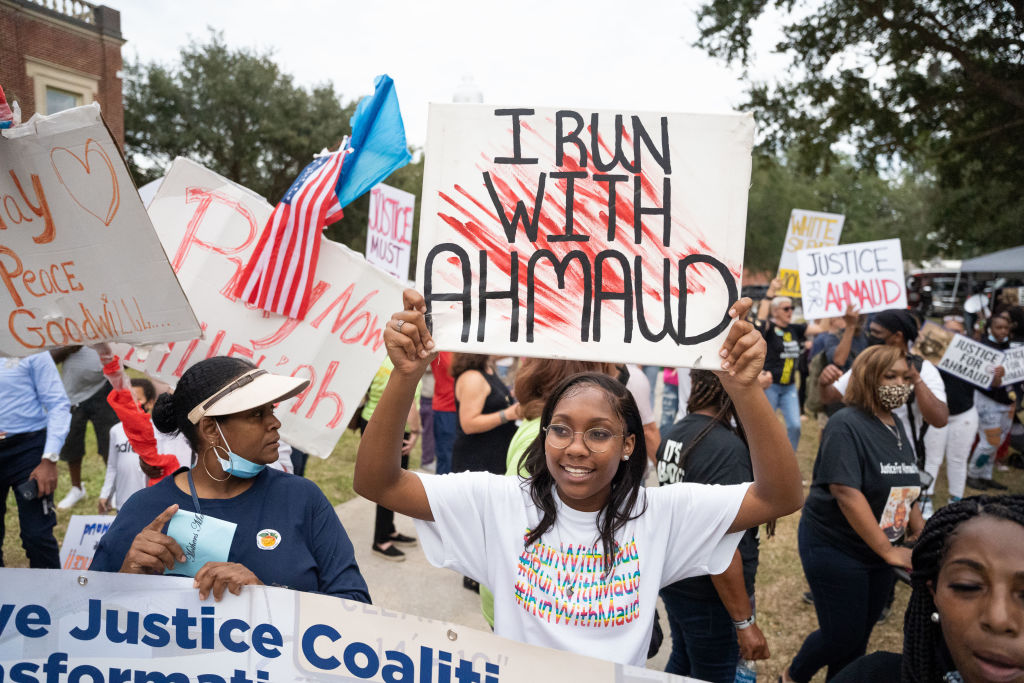Beyond The Verdict: Coalition Sees Justice For Ahmaud Arbery As A Beginning Of A More Just Georgia

Source: Sean Rayford / Getty
With closing arguments in the trial of the three white men accused of killing Ahmaud Arbery set to begin Monday, a local organization is encouraging people to commit their time and energy to organize and dream “beyond the verdict.”
Formed in May 2020 after the killing of Ahmaud Arbery at the hands of a father and son vigilante duo, A Just Georgia has a broad mandate forward. Beyond the verdict, the group has emphasized the need for transparent investigations of police misconduct and prosecutorial accountability for the first two prosecutors who obstructed justice.
“Fighting beyond the verdict means we must focus on the systemic issues that encouraged the criminalization of Ahmaud while coddling his killers,” the group stated. “George Barnhill and Jackie Johnson attempted to help Ahmaud’s killers escape prosecution. Neither prosecutor has been prohibited from practicing law.”
Here’s a reminder that @AJustGeorgia is committed to calls for justice #BeyondTheVerdict.
Follow to plug in and learn how you can plug in to advocate for much needed reforms to the legal system. So much work to be done, no matter the verdict. pic.twitter.com/SfUVhstBSO
— James “Major” Woodall (@iMajorWish) November 18, 2021
Much of the focus in prosecutorial misconduct has been on Jackie Johnson, the former district attorney who initially handled the McMichaels case and effectively blocked any legal action. But for the advocacy of the family and local community, this trial would likely never happen.
As former Georgia NAACP President Rev. James Woodall pointed out in a Twitter thread Sunday, both Johnson and Waycross Judicial Circuit District Attorney George Barnhill operated in a manner that focused on shielding the McMichaels, and indirectly William “Roddie” Bryan, from legal repercussions.
As for Barnhill, he is a senior prosecutor with decades of experience. His actions in this case were both reprehensible and is malfeasance to the highest degree. He’s STILL practicing law, though, and prosecuting cases.
No justice here, either. #AhmaudArbery pic.twitter.com/dDKUQ2eGzq
— James “Major” Woodall (@iMajorWish) November 21, 2021
Per his letter, Barnhill coordinated with Johnson before being officially assigned to the case. Along with Johnson, Barnhill gave the opinion that there were no grounds for arresting Arbery’s killers the day after the deadly incident.
Barnhill further states the three men operated within Georgia law but misrepresented the facts to fit within the prior Citizens Arrest statute. Nothing he cited justified the murder of an unsuspecting person.
Despite his actions, Barnhill has not been charged in connection with the case and has not faced any sanctions or other penalties from the state bar. In his nearly 40 years of experience, it was perfectly fine for three white men to murder a Black man because of “fear,” but not reasonable to understand that Arbery should be allowed to defend himself against provocation.
Allowing Barnhill to remain in practice and prosecuting cases remains an issue for the organizers with A Just Georgia. While a statewide organization, A Just Georgia focuses on lifting up and empowering local communities to lead in matters of injustice and nurturing existing leadership. In an interview last month with NPR, A Better Glynn co-founder Elijah B. Henderson questioned the ability to sustain momentum.
“Can we sustain any of this momentum toward true equity, equality and justice?” he asks. “Or are we just stuck in a cycle of some people get it and some people don’t at all? It depends. The American Constitution should not be a parchment of ‘it depends.’”
Focusing on real equity, equality and justice have been part of the mission of A Better Glynn and other local formations which seek to move the region forward. Part of the effort led to Johnson losing her re-election bid last November.
Beyond this trial, the broader issues of regional prosecutorial misconduct and charging discretion can be seen in the case of Marc Wilson. Wilson has been detained for 500 days without a fair chance at bail and little chance of a fair trial so long as the current judge remains over the case. There has been a push for the judge’s recusal.
Like the case with Arbery, Wilson’s case raises the question of who is seen as worthy of invoking self-defense and being in reasonable fear of their lives. Wilson has stated he was in fear of his life and his girlfriend after a group of drunken white teens tried to run them off the road last June.
The Arbery and Wilson cases cannot simply be dismissed as just being Georgia or the south. The injustice present in both is a feature of the system, not a bug. Coverage of the Arbery case has highlighted the racism present in the courtroom, but it’s a symptom of a broader issue within the American legal system.
The unspoken notion that courtrooms are white spaces for white actors to exact “justice” upon Black people persists in this country. The sentiment serves to undermine the dignity and curtail the basic rights of Black people whether they are the victim or the accused.
— #JustGeorgia (@AJustGeorgia) November 15, 2021
“The unspoken notion that courtrooms are white spaces for white actors to exact “justice” upon Black people persists in this country,” A Just Georgia tweeted last week in response to a defense attorney attacking Arbery’s mother for being understandably upset at reliving the trauma of her son’s killing. “The sentiment serves to undermine the dignity and curtail the basic rights of Black people whether they are the victim or the accused.”
See Also:
Wisconsin Activist Angela Lang On Moving Forward After The Rittenhouse Verdict
[ione_media_gallery src=”https://newsone.com” id=”3944536″ overlay=”true”]


